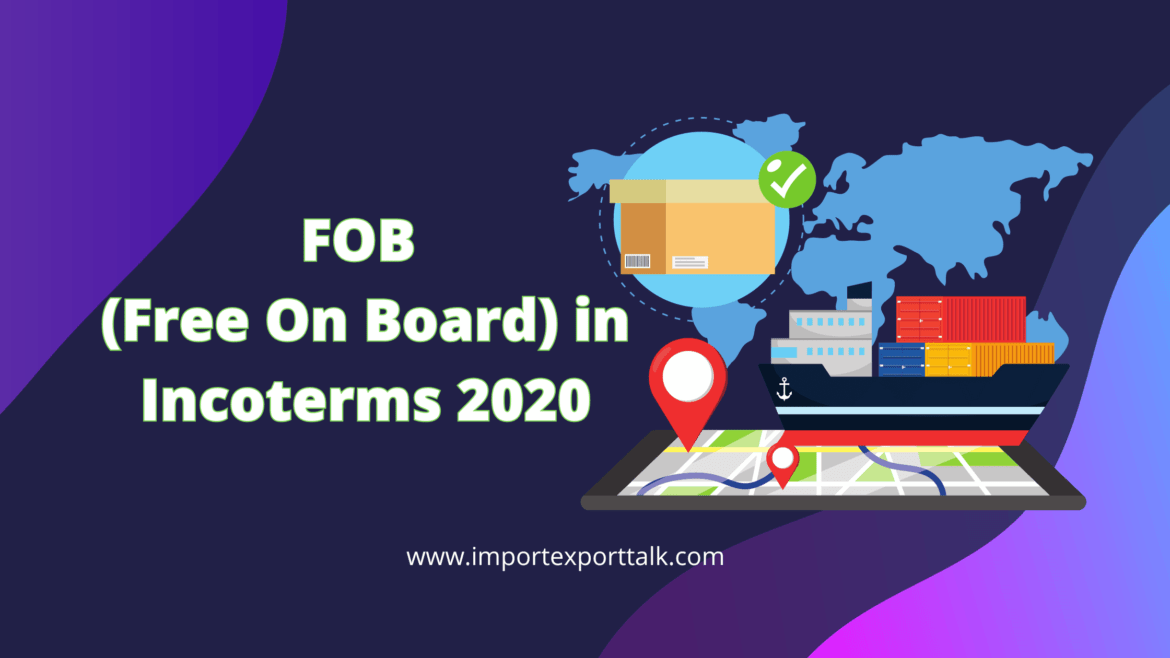Understanding the details of Incoterms 2020 is crucial in the ever-expanding world of international trade. Free On Board, or FOB, is one of these words that is used a lot to influence how buyers and sellers conduct business. We’ll unpack the subtleties of FOB in this post by looking at its definition, benefits, drawbacks, and function within the larger framework of Incoterms 2020.
Understanding FOB Incoterms 2020
FOB is more than simply an abbreviation in the context of Incoterms; it’s an important agreement that specifies the roles that buyers and sellers have during the shipping process. For those who are unaware, FOB refers to the moment when the buyer takes ownership of the products and the supplier meets their commitments. Now that we are aware of the details and shared obligations, let’s go into the details.
Definition :
Free On Board, or FOB, denotes that the items remain the seller’s property until they are placed into the vessel at the designated port. Ownership and risk are transferred to the buyer as soon as the goods pass the ship’s rail. This differentiation opens the way for a separate division of responsibilities between the seller and the buyer.
Key Characteristics and Responsibilities of the Seller:
Delivering the items to the port of shipment, paying export duties, and making sure that the packaging and documents are appropriate are all part of the seller’s responsibility under FOB. Up until the items are loaded onto the vessel, the seller is equally responsible for the risk.
Responsibilities of the Buyer:
The buyer assumes control once the cargo pass the ship’s rail. They are responsible for organizing and funding the principal transportation, managing import taxes and customs, and taking on risk as soon as the items are loaded.
Advantages of FOB Incoterms 2020
Cost Efficiency:
FOB benefits both parties financially. The buyer gets control over shipping costs, giving them greater freedom to select carriers and routes, while the seller can reduce costs by concentrating on getting products to the port of export.
Risk Distribution:
A reasonable distribution of risks between the seller and the buyer is guaranteed by the risk transfer at the ship’s rail in FOB. Having clear risk ownership facilitates improved risk management during the shipping process.
Flexibility in Shipping Methods:
Beyond the port of shipment, FOB offers freedom in selecting the mode of transportation. Customers are able to select the delivery options that best suit their needs at the lowest possible cost.
Disadvantages of FOB Incoterms 2020
Limited Control for the Seller:
The vendor is not responsible for any delays or problems that occur during the main carriage. The seller may face difficulties in ensuring timely and safe delivery of the products to the buyer’s location due to this mistake.
Potential Risks for the Buyer:
The vendor is not responsible for any delays or problems that occur during the main carriage. The seller may face difficulties in ensuring timely and safe delivery of the products to the buyer’s location due to this mistake.
Impact on Pricing:
FOB has cost benefits, but its effects on pricing dynamics are not insignificant. Buyers should carefully consider any additional expenses related to import tariffs, taxes, and main transport as these may have an impact on the total cost of the items.
Legal Considerations
Applicable Legal Frameworks:
A crucial aspect of FOB transactions is navigating the legal environment. Comprehending the relevant legal frameworks, such as international trade rules and conventions, guarantees adherence and reduces legal hazards for all involved parties.
Contractual Agreements and Documentation:
In FOB transactions, detailed and transparent contractual agreements are crucial. A successful transaction is largely dependent on the contract’s detailed description of the parties’ roles and responsibilities as well as any special terms. For legal clarity, proper paperwork is equally important, and this includes bills of lading and commercial invoices.
FOB and Logistics
Integration with Logistics and Supply Chain:
The relationship between FOB and logistics goes beyond the port of shipping. Examining FOB’s integration with the larger supply chain and logistics network helps to clarify how it affects distribution, inventory control, and overall productivity.
Role in Shipment Monitoring:
Monitoring shipments effectively requires teamwork. The supply chain’s overall reliability is improved by knowing how FOB affects shipment monitoring and the part stakeholders play in maintaining visibility and transparency.
Successful FOB Transactions
Effective Communication:
Effective communication is essential for FOB transactions to be effective. Collaboration is improved and misunderstandings are reduced when vendors and buyers have clear expectations and communication routes.
Understanding Local Regulations:
It’s critical to navigate the complexities of local laws. The import / export laws of the relevant nations must be understood by both sellers and purchasers in order to ensure compliance and avoid any possible legal problems.
Collaborating with Reliable Partners:
Selecting trustworthy partners is essential for FOB transactions, including freight forwarders and carriers. Working with reputable and skilled organizations helps to ensure that the procedure goes off without any problems.
Changes in Incoterms 2020:
Periodically, Incoterms are updated to reflect changing industry standards. By examining the modifications made by Incoterms 2020, companies can make sure they are current and can modify their plans accordingly.
Challenges and Solutions In FOB
Common Challenges in FOB Transactions:
Businesses can better plan for probable obstacles in FOB transactions by recognizing frequent constraints, such as logistical problems or breakdowns in communication.
Strategies for Overcoming Challenges:
By putting into practice sensible tactics, including improved communication guidelines or backup plans, companies can be better equipped to deal with problems early on and preserve the integrity of FOB transactions.
Beyond its literal definition, FOB has deeper meanings. It is a crucial stage in the transaction process that affects risk allocation, cost dynamics, and the general effectiveness of international supply chains.
CIP (Carriage and Insurance Paid To) in Incoterms 2020
Global Trade with CPT IncoTerms 2020
FCA (Free Carrier) in Incoterms 2020
EXW (Ex Works) in Incoterms 2020
Understanding Incoterms 2020 for Delivery of Goods
FAQs on FOB (Free On Board)
FAQ 1: What does FOB stand for in Incoterms 2020? FOB stands for “Free On Board,” indicating the point at which the seller’s responsibilities end, and the buyer assumes control of the goods.
FAQ 2: How does FOB affect shipping costs? FOB allows buyers to have control over shipping costs beyond the port of shipment, providing flexibility in choosing cost-effective shipping methods.
FAQ 3: Can FOB be used for all types of goods? FOB is versatile and can be used for various goods, but its suitability depends on factors like the nature of the goods and transportation requirements.
FAQ 4: What are the key differences between FOB and CIF? While FOB places responsibility on the buyer after loading, CIF includes freight and insurance costs, with the seller responsible for these until delivery.
FAQ 5: How has FOB evolved over the years? FOB has evolved to adapt to changing trade practices, with updates in Incoterms reflecting the dynamic nature of international commerce.
To further your understanding of international trade and Incoterms :
- International Chamber of Commerce (ICC): Incoterms® 2020
- World Trade Organization (WTO): International Trade and COVID-19
- United Nations Conference on Trade and Development (UNCTAD): Trade and Development
- Trade Associations and Chambers of Commerce

